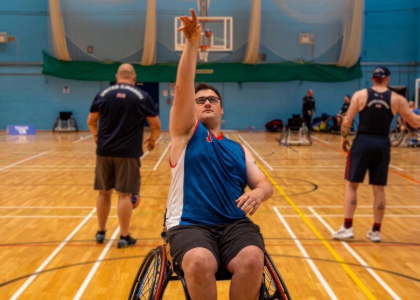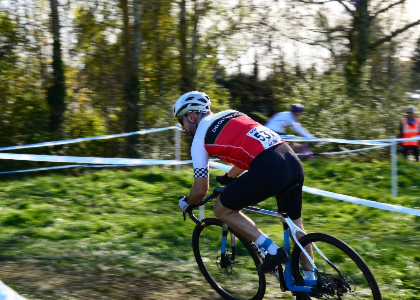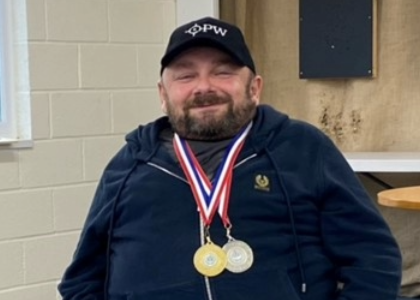
Our Disability Support Fund is there to help members who need assistance with the specific expenses associated with competing in their chosen sport or activity. Because the specialised equipment is usually non-standard and the training and travel requirements often more bespoke, para-athletes and disabled members often incur greater expenses.
The Disability Support Fund is topped up by the proceeds from the CSSC community lottery. So, every ticket purchased directly benefits our members.
One such recipient was Caroline MacDonald, who was kind enough to share her incredible story of resilience and persistence.
“I was injured in 1996, I damaged my spinal cord leading to paralysis from my chest down, amongst a whole host of other challenges. Before this point in my life, I was sailing along quite well as a 24-year-old, newly qualified teacher, who had just bought my first house.
My injury totally upended everything. I was really lost when I came out of hospital in my huge NHS standard wheelchair. I didn’t know any other young disabled people, so I really didn’t feel that I had a roadmap for how I was going to live my life. I was retired from teaching, in those days disabled people didn’t have employment rights and it was never considered I would go back to work. But I had always loved sports, so when I saw on the BBC local news that there was a wheelchair tennis tournament at a city near me, I decided to go along to find out a bit more about it.
Turning up at the tournament as a spectator really opened up my world. I met dozens of young disabled people with positive life stories. They had careers, families, exciting and fulfilling lives and were sporting heroes. They welcomed me with open arms, sharing lots of advice, from basic life skills like how to access a better wheelchair, to quick quips I could use when people made discriminatory comments. Some of the players I met on that day remain among my closest friends nearly 30 years later.”
A new independence and confidence
“I immediately got the tennis bug, going to an LTA beginners’ weekend and finding a local club that ran regular wheelchair tennis sessions. Playing tennis helped me to build up my stamina and wheelchair skills, so in my life away from the court I could be much more independent and confident to go to new places. It also introduced me to a fraternity of disabled people who became a great support system.
Tennis brought me some great mental health benefits. I gained confidence from all the things my body could still achieve, and the positive endorphins released each session really gave me a boost. Best of all, for two or three hours each session all I had to think about was smacking a ball around a court, leaving behind all the stresses of the outside world for a while.
After a few months I realised I was actually quite good! I started entering local and then national competitions, and within a couple of years I was winning trophies and even small amounts of money. The prize money in wheelchair tennis has never compared to the running game, in those days it didn’t even cover travel costs. But, the sense of achievement to be able to say “I’m a professional athlete” really can’t be overstated!
Tennis really helped me to rebuild my life in so many ways, and as my confidence grew, I found my way back into the world of employment. I went on to study a Master’s in Social Work and Social Policy, and I met my husband while I was working as a mental health social worker. After we were married and had my daughter, I didn’t want to be travelling to tournaments so much. So, I always played just for the sheer joy of smacking a ball around a court for an hour or two.”
Swapping rackets with oars
“When my daughter started school, I wanted a new challenge and after watching para rowing at the Paralympics I found a local club and went along to have a go. My new club coach, at Tees Rowing Club, realised at my first session that I was actually very fast. My first time on the rowing machine, I started rowing at world record pace. So very quickly I was subsumed into the world of para rowing! My training schedule was very gruelling, I trained six days a week, at least two sessions a day, around working full time and raising my beautiful daughter. But we got to travel around the world as a family and had some amazing experiences. I picked up quite a few titles along the way, including five British Championships, two European and two world titles.
I was better at rowing than tennis, but (please don’t tell all my rowing friends!) I have always secretly preferred the court to the river. So, it was with something of a relief at the age of 42 I retired from rowing and returned to tennis. I was determined that after all the gruelling training, I was going to play non-competitively and enjoy cake and wine! However, before I knew it, I was full-heartedly throwing myself back into international tennis, and I managed to pick up my last British Championships Titles, singles and doubles, at the ripe old age of 47!”
Rebuilding confidence and self-belief
“Since winning the British Champs in December 2019 I’ve had a series of serious health problems, including blood clots on my lungs and nerve damage in my abdomen, which have meant that for the last four years I’ve spent long periods on bed rest and generally not feeling well. But as my health has started to improve, I know that what I need to get back into a better mental and physical place is to return my much-loved tennis. I need to feel that competitive buzz, rejoice in what my body can still achieve and spend time with my fraternity of disabled peers. Maybe I can even be that positive role model for a newly disabled person in the way that my friends were for me back in 1996.
As I’ve not competed internationally for so long, I’ve had a bit of a mountain to climb to get back into a good competitive condition and rebuild my skills. This is where the grant from CSSC has been so very valuable. It’s helped me to access coaching from a coach with an interest and skills in wheelchair tennis, and to refresh my tennis rackets and bag that were so battered they were literally held together with tape. The coaching has really elevated my playing, so I feel confident to be able to get back out there and really compete. But more than anything, the feeling that this support has come from my fellow civil servants means so much I’m not sure I can even put into words. I believe that all my colleagues, both near and far, are really rooting for me. It’s a feeling I’m going to take out onto the court when I play in my first international, the Swedish Open in April 2024. When I take to that court I’ll be very proud to represent the civil service.
My training programme involves playing with both non-disabled and disabled tennis players, before and after work and over the weekend. I have one-to-one training with a coach twice a week (paid for through my CSSC grant), and I join drills sessions a further three times a week. I have regular hitting partners whom I play with three times a week, I do two cardio tennis sessions to increase my fitness and I join two local club competition nights, so that I get regular match practice. In addition, I also regularly hand-bike for additional cardio fitness and I join a yoga class, once a week, to help with flexibility. My wheelchair tennis doubles partner lives a two-and-a-half-hour drive from me, so I join her, or she joins me for a weekend of training once a month.”
Giving back and sharing my love of the game
“I coach beginner players twice a week, on a voluntary basis. I find it incredibly satisfying to help other people on their wheelchair tennis journey, and to watch them flourish in our sport.
My advice to anyone wanting to give it a go is to get in touch with the Lawn Tennis Association who hold regular beginners’ camps around the country. There’s a lot of equipment involved in wheelchair tennis, and the camps are great for providing an opportunity to try out the different equipment to see what you need for the best start, as well as being a relaxed and fun way to meet people and start hitting some balls.
Almost anyone, whatever your impairment, can play tennis. People can play in electric chairs, or with one hand and one arm, where there’s a will there’s definitely a way. The LTA are the experts in making sure you can find the best way to get started. As well as wheelchair tennis there’s also visually impaired tennis, learning disability tennis, deaf tennis and para standing tennis – also known as adaptive standing tennis.
And a few questions for Caroline...
Are there any sporting heroes who you admire most?
“A woman I really admire is Dame Tanni Grey Thompson. She was an amazing athlete and coach, trailblazing for her sport in the days when para sports didn’t receive the recognition it deserved. Now she is a powerful ambassador for disability rights, using her platform both within the House of Lords and much more widely to champion inclusion. I’ve always told my daughter that the women I admire are those that may have setbacks and get knocked down, but they find the resilience to get back up and keep going – and I really recognise that fighting spirit in Dame Tanni. She has inspired me in my sporting life and her tenacity and integrity are values I try to aspire to in my civil service career.”
How did you first hear about CSSC?
“I found out about CSSC from an email that came into my work account, and initially joined as my family enjoy visiting English Heritage and I could see that I could gain free family entry, year-round. I was also interested in the ‘days out’ opportunities.
After I’d been a member for a while, I was exploring the sports and activities section and noticed that members could apply for funding. Initially I thought I’d probably not fit into the categories, as I don’t think of myself as an elite athlete, but when I read further, I saw that there was a disability category which might be suitable for me. As I was so very keen to get back into competitive tennis, and really needed some help to get there, I decided to reach out to the funding coordinator, Linda, who provided some excellent advice. From there I took the plunge and put together an application.”
Where do you see yourself in 10 years’ time?
“I’ll be 62 in 10 years’ time, so at that point I’m hoping I’ll be looking back on my sporting career and feeling satisfied that I’ve achieved everything that I could within my abilities. I don’t want to feel any regrets from the paths I’ve not tread. I’ll also be looking to the future as I’ll be close to retirement from the civil service, and I’d love to be able to expand on my volunteer coaching role to help more people reach their sporting aspirations.”
What advice would you give your 10-year-old self?
“Things might not go as you plan them, but you’ve got the resilience to get through the challenges and you will have some wonderful adventures as you travel along a road you have never even imagined.”
And finally…
- Summer or Winter holiday? – Summer, to avoid the worst of the snow, but to cooler countries with beautiful landscapes to explore such as Norway or Alaska
- Live in the city or country? Country
- Sweet or savoury? Savoury
- Movies, music or books? Books
- Favourite movie, book or song? Name of the Wind by Patrick Rothfuss
- What one thing would you take to a desert island? A solar powered kindle loaded with books
- What superpower would you most like? As a wheelchair user, flying would be very handy for all those pesky stairs!
- Which famous person do you admire the most past or present? Stephen Hawking
- What accomplishment are you most proud of? My daughter, somehow I’ve managed to bring up a very wonderful young woman.
Follow in Caroline’s tracks
If you’ve been inspired by Caroline’s remarkable story, why not explore our funding opportunities? Whatever your skills, age, experience, ability or aspirations, there’s a fund perfect for you.



